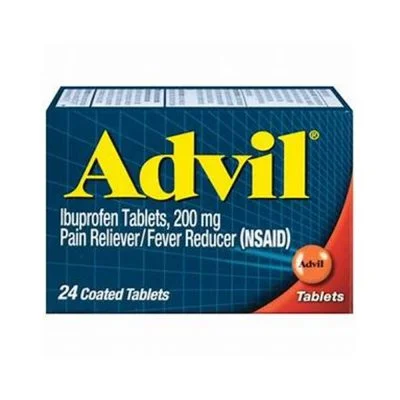Advil tablet: Uses, Dosage, Side Effects, and Warnings
Introduction Advil tablet is a Nonsteroidal anti-inflammatory drug (NSAID) that is often recommended by doctors to treat or relieve pain, lower fever, and reduce inflammation. Generic Name Ibuprofen Dosage Form Tablets Ingredients It contains Ibuprofen as an active ingredient. In this medication, the strength of dosage is typically 200mg. How Does Advil Tablet Work? Mechanism: In our body, there are chemicals known as prostaglandins which are responsible for causing inflammation, pain, and fever in our body. This medication prevents the production of these chemicals by inhibiting the production or levels of prostaglandins, Advil helps to relieve symptoms like pain and inflammation. Uses Of Advil Tablet Reduce Inflammation: It reduces inflammation and swelling especially those associated with rheumatoid arthritis and osteoarthritis. It also treats inflammation related to injury. Pain Relief: It is used to treat pain especially mild to moderate headaches and reduce the intensity of migraines. Fever Reduction: Advil reduces fever as well both in children and adults. Dosage Take it as prescribed by a doctor. Overdose If you have taken more than the recommended. Seek medical help. Missed Dose If you have missed a dose take it as soon as possible otherwise don’t double the dose to cover the missed one. Off-Label Uses Using medication for those health conditions for which the medication is not approved officially is known as off-label uses. Active arthritis Acute gout Pericarditis Migraine prevention Side Effects of Advil Tablet Common Side Effects Heartburn Diarrhea or constipation Rash Stomach pain Dizziness Headache Nausea Serious Side Effects Bleeding Sweating Upset stomach, vomiting Experiencing sudden weakness on one side of your body Trouble in understanding speech Pain in the different parts of the body such as the back, jaw, arm, or throat Warnings and Precautions Some warnings and precautions before taking this medication. Take it with caution or under strict guidance from the doctor if you are pregnant or in the breastfeeding era. It may interact with other medications, So Inform the doctor about the medication you are already taking. Inform the doctor about your health history such as Heart problems, Bleeding problems, Kidney or liver problems, Asthma, or High blood pressure. Don’t take it if you are allergic to Advil tablets. Don’t take this medicaiton before or after a Coronary artery bypass graft (CABG) . Drug Interaction Advil tablet may interact with the following medications Blood thinners: Those medicines used to prevent blood clots or increase blood bleeding such as Warfarin, Coumadin, and Jantoven. Corticosteroids: These medicines are used to treat certain inflammatory conditions. Pemetrexed: Medicines that are used for certain cancers such as Alimta, and Pemfexy. Digoxin: This is a medicine used to treat heart failure or certain abnormal heart rhythms. Lithium: A type of medicine used to treat conditions related to Mental health. Storage Store it at room temperature (between 20°C to 25°C) Keep it away from children and pets. Keep it away from moisture and heat. Disclaimer This article is for information purposes only don’t take it as medical advice. It may lack some information so please use Advil tablet according to the doctor’s advice.
Advil tablet: Uses, Dosage, Side Effects, and Warnings Read More »
